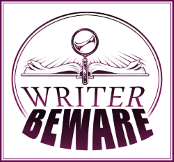Writer Beware®
HOME
OVERVIEW AND SITE MAP
ABOUT WRITER BEWARE ®
CASE STUDIES
CONTESTS AND AWARDS
COPYRIGHT
EDITORS AND EDITING SERVICES
LEGAL RECOURSE AND OTHER REMEDIES
LITERARY AGENTS
MISCELLANEOUS “BEWARES”
SELF-PUBLISHING
SMALL AND INDEPENDENT PUBLISHERS
VANITY, SUBSIDY, AND HYBRID PUBLISHERS
WRITER BEWARE: THE BLOG
About Writer Beware®
Who Is Writer Beware®?
Writer Beware® is sponsored by the Science Fiction and Fantasy Writers Association ( SFWA®).
Like many genre-focused writers’ groups, SFWA® is concerned not just with issues that affect professional authors, but with the challenges and pitfalls that face aspiring writers. Writer Beware®, founded in 1998, addresses that concern by tracking, exposing, and raising awareness of schemes, scams, and other bad practice in the publishing industry, with the aim of providing writers with tools to protect themselves from exploitation.
Writer Beware’s® resources include the Writer Beware® website, which provides general warnings about a wide variety of literary schemes and scams, along with information on how writers can recognize and avoid them; the Writer Beware® blog, which unmasks schemes and scams in real time and covers publishing industry news and other items of writerly interest; the Writer Beware® Facebook page, which links to writing-related articles, blog posts, and news items, and provides a forum for discussion; and the Bluesky account of Writer Beware® co-founder Victoria Strauss.
Although we’re sponsored by a US-based organization of professional writers of speculative fiction, our efforts aren’t limited by country, market, genre, or publication history. We’ve designed the Writer Beware® website to be usful to any writer at any stage of their career, regardless of subject, genre, or nationality.
We are untouched by AI: Writer Beware® does not use generative AI to create, edit, or correct our content.
“Writer Beware” is an officially registered service mark of the Science Fiction and Fantasy Writers Association.
Writer Beware® is a volunteer effort. SFWA® funds our expenses, but we receive no salaries, stipends, or other remuneration.
Our staff:
Victoria Strauss

Victoria Strauss, co-founder of Writer Beware®, is the author of nine novels for adults and young adults, including the Way of Arata epic fantasy duology (The Burning Land and The Awakened City) and a pair of historical novels for teens, Passion Blue and Color Song. She has written hundreds of book reviews for publications such as SF Site, and her articles on writing have appeared in Writer’s Digest and elsewhere.
She received the 2009 SFWA® Service Award for her work with Writer Beware®, and in 2012 was honored with an Independent Book Blogger Award for the Writer Beware® blog, which she maintains. She’s webmistress of the Writer Beware® website, which she also created, and maintains the Writer Beware® database and Facebook page.
Visit Victoria at www.victoriastrauss.com. Follow her on Bluesky, where she tweets about publishing and Writer Beware-related issues (along with an occasional gardening or cat photo).
Michael Capobianco

Michael Capobianco served as President of Science Fiction and Fantasy Writers Association from 1996 to 1998 and again from 2007 to 2008. In addition to being a Writer Beware staffer, he currently serves as Chair of the SFWA® Contracts Committee, Co-chair of its Legal Affairs Committee, and Authors Coalition Commissioner. He received the SFWA® Service Award in 2004.
Capobianco has published two solo science fiction novels, Purlieu and Burster, and is co-author, with William Barton, of the hard SF books Iris, Alpha Centauri, Fellow Traveler, and White Light, as well as several short stories and magazine articles on exploration of the solar system.
Visit Michael at capobian.com/.
Richard C. White

Richard C. White is the author of tie-in fiction for a number of media franchises, including Star Trek and Doctor Who, as well as an original novels–including Gauntlet Dark Legacy: Paths of Evil and Harbinger of Darkness–and two short story collections, For a Few Gold Pieces More and Chasing Danger: The Case Files of Theron Chase.
His non-fiction work, Terra Incognito: A Guide to Building the Worlds of Your Imagination, has been selected to be the text book for a Visual Design course at Becker College (MA).
Among other interesting jobs, he has worked as a journalist, a substitute teacher, an independent comics publisher, an analyst for the military, and a technical writer. He is pursuing his Masters of English at Bowie State University and was recently selected to be a member of Sigma Tau Delta (The International English Honors Society).
Visit Rich at www.nightwolfgraphics.com.
In Memoriam

Writer Beware® Co-Founder A.C. Crispin
Ann C. Crispin, co-founder of Writer Beware® and Chair of the SFWA® Committee on Writing Scams, became active in SFWA® in 1983. She served as Eastern Regional Director for almost ten years, and as Vice-President for two more. With her husband, two-time SFWA® President Michael Capobianco, she was a 2004 recipient of the SFWA® Service Award.
Her more than twenty novels include the best-selling Han Solo Trilogy; New York Times best-selling Star Trek novels Yesterday’s Son, Time for Yesterday, and Sarek; the original series Starbridge; and her final novel, Pirates of the Caribbean: The Price of Freedom. Her many freelance credits include articles in Writer’s Digest and the SFWA® Bulletin.
Ann passed away in 2013, but her tireless work with Writer Beware® stands as an enduring legacy. Visit Ann at www.accrispin.com.
What Does Writer Beware® Do?
For more than twenty-five years, the mission of Writer Beware has been to track, expose, and raise awareness of questionable, illicit, and/or nonstandard practices in and around the publishing industry.
- We maintain and update the Writer Beware website with the latest information on literary schemes, scams, and pitfalls, and the most current information on what writers can do to protect themselves.
- To complement the general advice and warnings on the Writer Beware website, our popular blog provides up-to-the-minute information on schemes and scams that target writers–along with advice for writers, industry news and commentary, and a special focus on the weird and wacky things that happen at the fringes of the publishing world.
- Our Facebook page links to articles, blog posts, news items, and warnings of interest to writers, and provides a forum for discussion.
- Victoria’s Bluesky feed offers Writer Beware- and writing/publishing-related news, alerts, and warnings.
- We constantly research the subjects we discuss, reading trade publications and subscribing to professional newsletters and mailing lists in order to keep current with issues and changes in the publishing industry. We’re in regular touch with reputable agents and editors, so we can better contrast their business practices to the nonstandard practices we warn against.
- We maintain an extensive database of questionable literary agents, publishers, independent editors, writers’ services, contests, publicity services, and others. This database has been assembled thanks to the hundreds of writers and publishing professionals who have contacted us to share their experiences and to provide us with documentation. Our database is the most complete of its kind in the world.
- We offer a free research service for writers with questions about agents, publishers, and others (e-mail us at beware@sfwa.org). The information we provide is supported by multiple similar reports and complaints from writers, by documentation, or, in most cases, by both.
- We assist law enforcement agencies with investigations of questionable agents, publishers, and others. Writer Beware has been instrumental in the convictions of several literary scammers.
- We help build public awareness of our mission by writing articles (our work has appeared in the SFWA® Bulletin and Writers’ Digest, among others), appearing at writers’ conventions and industry events, conducting workshops and classes, and participating in online writers’ discussion groups and message boards.
Contact Writer Beware®
We welcome questions, comments, and especially documentation. Here’s how to contact us:
- Email: beware@sfwa.org
We accept email attachments. If you need to send us paper documentation (correspondence, contracts, invoices, brochures, etc.), contact us for a physical address. We will gladly reimburse your photocopying and/or postage expense.
Correspondence and documentation sent to Writer Beware is held in strict confidence. Your name, contact information, or other information that could identify you will never be shared or publicly posted without your permission, or otherwise disclosed except to appropriate law enforcement agencies, in response to an enforceable subpoena, or as directed by counsel.
We cannot accept anonymous complaints, complaints that don’t name the target of your complaint, or second-hand complaints (we can’t accept your report of your friend’s bad experience with their publisher–your friend needs to contact us directly). Any documentation you send must be original and complete (i.e., send the entire email, not cut-and-pasted text).
Please do not send us your manuscripts or query letters! Writer Beware is glad to share information and answer questions, but we are not agents or publishers, and we cannot read or critique manuscripts, query letters, or any other form of writing. Emails with attached manuscripts or writing samples will be deleted without response.
Writer Beware appreciates the thought, but we don’t accept donations. If you’d like to help support the organization that sponsors us, please consider donating to SFWA®’s benevolent funds.
What’s Questionable?
Writer Beware is best known for its warnings about literary fraud, but our focus is much wider than that.
Amateur and marginal agents, unprofessional publishers, inexperienced editors, and other unqualified or unskilled people/services/companies can do just as much damage to a writer’s career as scammers can. Successful literary professionals sometimes have author-unfriendly business policies. And a writing-related business can be predatory without actually being fraudulent. Writer Beware focuses on any and all questionable practice in the publishing world.
What does Writer Beware consider “questionable?” What practices define a questionable agent or publisher? How do we distinguish between writers with genuine complaints and those who are merely angry at being rejected, or who had unrealistic ideas about what an agent or publisher could or should accomplish? Is any complaint, no matter how small, enough to put an agent or publisher on our watchlist?
We define “questionable” as nonstandard or fraudulent practice not in writers’ best interest. This includes (but is by no means limited to):
- Fees where it’s exploitative or not customary to charge them. Agents who demand reading fees, evaluation fees, retainers, “marketing” or “submission” fees. Publishers (as distinct from self-publishing services) that withhold royalties to recoup production expenses, or require writers to buy critiques, pre-purchase books, or pay for some aspect of the publication process. Writing contests that make a secret profit with high entry fees.
- Conflicts of interest. Agents who recommend their own paid editing services, or steer clients toward PR services or other businesses they themselves own or have a financial interest in. Fee-charging publishers or independent editors who pay kickbacks for referrals.
- Abusive or nonstandard contract terms. An agent who claims an inappropriate financial interest in a client’s future work, or perpetual representation rights to any work they sell. A publisher that takes ownership of writers’ copyrights, or pays royalties on net profit.
- Unprofessional, deceptive, or exploitative practices. Agents who place writers with vanity publishers. Publishers that don’t publicly disclose their fees, or attempt to turn authors into customers by pressuring them to buy their own books. Independent editors who claim that manuscripts must be “professionally” edited in order to be competitive. Marketing companies that sell PR services of questionable value at inflated prices.
- Nonperformance. Agents who fail to submit clients’ manuscripts, or who’ve been in business for years and still have no sales. Publishers that breach contractual obligations, fail to publish books, or fail to pay royalties. Independent editors or marketing services that take clients’ money and don’t deliver, or deliver substandard products.
- Lack of qualifications. An agent, publisher, or other purported literary professional who sets up in business without relevant training or work experience. This is by no means fraudulent, and such people are often well-intentioned–but they lack the skills to do the job.
- False or misleading representations. Literary agents or editors who lie about their credentials and/or accomplishments. Literary agencies that claim clients they don’t have or sales they haven’t made. Publishers that lie about sales records or financial health, or make extra-contractual promises they don’t fulfill.
- Fraudulent practices. Companies and individuals who take the money and run. Scammers who impersonate reputable literary agents and/or publishers in order to convince writers to pay large fees. Fee-charging contests that never declare winners. Bait-and-switch schemes that promise benefits and/or remuneration but are actually fronts for phishing or fee-charging.
The above is just a sampling of the kinds of complaints we receive. We ask writers to substantiate their reports with documentation wherever possible (letters, e-mails, contracts, website links, brochures, publicity information, etc.). As noted above, we don’t accept anonymous or second-hand complaints, and we don’t open a file on an individual or company unless we’ve received at least two substantially identical reports, or a single report with full documentation.
Occasionally we hear from authors who have general gripes about the the publishing industry, or are upset by something that’s fairly routine–agents’ long turnaround times, publishers rejecting manuscripts without explanation. As frustrating as such things are, they’re unfortunately very common–an aspect of the publishing landscape that any writer will have to deal with.
We also sometimes hear from writers who are angry that an agent didn’t manage to sell their manuscript, or didn’t call often enough with updates, or sent a dismissive rejection letter. We don’t often regard issues like these as documentable complaints, because they’re general problems that anyone can encounter in the ordinary run of things (and may reflect unrealistic expectations on the writer’s part). Occasionally, with multiple similar reports, they do add up to a pattern. But that doesn’t happen very often.
We’re careful to distinguish between genuine bad practice and writers’ sour grapes, and to back up our warnings with as much documentation as possible. We want to provide balanced information that writers can depend on. To that end, we must be as responsible in our data collection and our dissemination of information as we expect agents, publishers, and others to be in their business dealings.
Except for graphics, and where specifically indicated, all Writer Beware® contents copyright © Victoria Strauss
MAY NOT BE REPRODUCED WITHOUT PERMISSION

